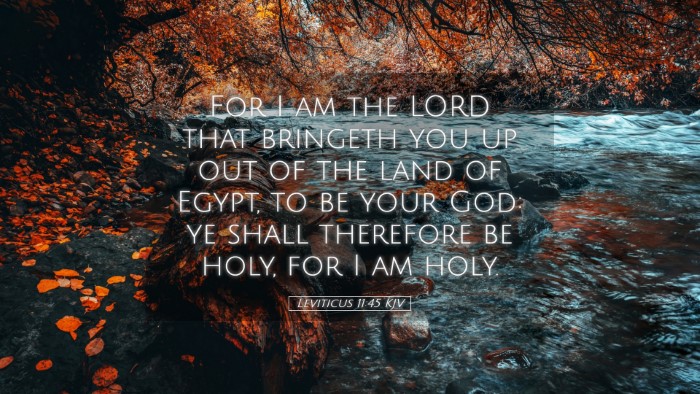Commentary on Leviticus 11:45
Verse Text: "For I am the LORD that bringeth you up out of the land of Egypt, to be your God: ye shall therefore be holy, for I am holy."
Introduction
In Leviticus 11:45, God articulates a fundamental principle of holiness expected of His people. This directive not only invites theological reflection but also provides a glimpse into God's redemptive nature. The verse encapsulates God's covenantal relationship with Israel, affirming His role as both their Deliverer and their God.
Theological Significance
As noted by Matthew Henry, this verse underlines the holiness of God as a motivational basis for Israel's call to holiness. The phrase "I am the LORD" emphasizes God's sovereign identity and authority over His people, establishing a clear distinction between the Creator and His creation. To be "holy" implies a separation from common or profane, designating the Israelites as a peculiar people, set apart for divine purposes.
Adam Clarke elaborates on this relationship, indicating that the holiness required is a reflection of God's own nature. The command to be holy entails a life of obedience, aligning human conduct with divine expectations. Through their conduct, God's people testify to His character, revealing the transformative power of living in accordance with His will.
Covenantal Context
Albert Barnes emphasizes the significance of Israel's deliverance from Egypt as a pivotal moment that establishes this covenantal obligation. The Exodus serves as a foundational narrative not only for Israel's identity but also for their ethical and moral conduct, arising from their experience of salvation. In claiming them as His own, God expects His people to embody the values He instills, marking them distinct from surrounding nations.
This covenantal theme is crucial to understanding the broader narrative of Scriptures, as it establishes a framework for Israel's relationship with God. The call to holiness is not merely a command but an invitation into a transcendent life that mirrors God's moral excellence.
Application to Christian Life
The implications of Leviticus 11:45 resonate deeply within the New Testament context as well. The theme of holiness is revisited in the teachings of Christ and the writings of the apostles. Matthew Henry suggests that the call to holiness remains relevant, with Christians being urged to emulate Christ's character while growing in their faith and obedience.
This verse serves as a reminder that the call to holiness is one of mutual relationship; it challenges contemporary believers to reflect on their own lives in light of God's holiness. Adherents are encouraged to pursue sanctification, living lives marked by moral purity and spiritual growth.
Holiness as a Community Ethic
Furthermore, the call to holiness extends beyond individual piety to the corporate identity of the community of faith. Albert Barnes points out that the holiness delineated in Leviticus contributes to the integrity of the community, fostering a collective testimony of God's righteousness. It encourages believers to support one another in faithfully pursuing this divine standard.
This communal aspect is particularly pertinent in the modern church, where the collective witness of the body becomes crucial in a world that often trivializes moral boundaries. The pursuit of holiness enriches fellowship and mutual accountability, encouraging believers to hold one another to the transformative ideals modeled by Christ.
Conclusion: The Urgency of Holiness
In conclusion, Leviticus 11:45 encapsulates a divine mandate that resonates through both Old and New Testaments. The unchanging nature of God as the source of holiness calls His people to reflect His character in all aspects of life. The insights from Matthew Henry, Albert Barnes, and Adam Clarke provide a robust framework for understanding this critical biblical principle.
As believers engage with this verse, they are reminded of their identity rooted in God's deliverance and the ongoing call to live distinctively in a world that stands in need of divine truth. The charge to holiness is not merely regulatory but transformative, inviting engagement with the community of faith and a deeper understanding of God's redemptive purposes.


